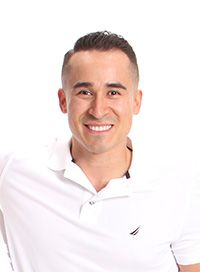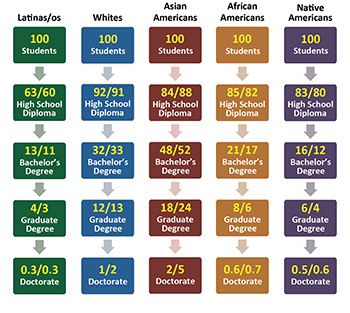 As a 2015 research report from the UCLA Chicano Studies Research Center illustrates, less than 1% of the Latino population has obtained a PhD. This data point is of particular relevance to me as a first-generation Latino who is halfway through a PhD program. By looking at the data point, there was a low probability of me completing an undergraduate education and much less so, enrolling in a doctoral program. As many first-generation students (students for whom neither parent has a college degree), I faced the daunting task of navigating a higher education on my own. Being the youngest of three, I did not have family members who I could turn to with questions about accessing and navigating a college education. As an undergraduate student at Cal Poly Pomona, a campus that is comprised mostly of students of color, I was fortunate enough to receive quality mentorship from faculty who answered my questions and illuminated the path to a graduate education. The guidance and support that I received there was from a predominantly white faculty, and with that there was something that I noticed was lacking: diversity in my role models, mentors, and faculty. Similar to what I noticed during my undergraduate years, I feel that as graduate students of color, we do not have the role models at the faculty level who share our backgrounds and that there is still much that needs to be done to do increase the number of faculty of color.
As a 2015 research report from the UCLA Chicano Studies Research Center illustrates, less than 1% of the Latino population has obtained a PhD. This data point is of particular relevance to me as a first-generation Latino who is halfway through a PhD program. By looking at the data point, there was a low probability of me completing an undergraduate education and much less so, enrolling in a doctoral program. As many first-generation students (students for whom neither parent has a college degree), I faced the daunting task of navigating a higher education on my own. Being the youngest of three, I did not have family members who I could turn to with questions about accessing and navigating a college education. As an undergraduate student at Cal Poly Pomona, a campus that is comprised mostly of students of color, I was fortunate enough to receive quality mentorship from faculty who answered my questions and illuminated the path to a graduate education. The guidance and support that I received there was from a predominantly white faculty, and with that there was something that I noticed was lacking: diversity in my role models, mentors, and faculty. Similar to what I noticed during my undergraduate years, I feel that as graduate students of color, we do not have the role models at the faculty level who share our backgrounds and that there is still much that needs to be done to do increase the number of faculty of color.

I recently had the pleasure of attending the national conference for the Society for the Advancement of Chicanos and Native Americans in Science (SACNAS) to represent my program, Molecular Biology, Cell Biology and Biochemistry (MCB). During my visit, I reflected on my initial thoughts of when I first attended SACNAS. I was under the impression that the conference was going to be like any other meeting I had attended, but I was pleasantly proved wrong. My first time attending SACNAS was the first time in my life that I had seen so many brilliant scientists and scientist-in-training from different fields of science that looked like me, spoke like me, and had “first-gen” experiences similar to mine. I gladly attended again this year because of the sense of community that is felt for those few short days. Attending these meetings with minority scientists has reinforced the notion that I can complete my PhD, especially at a time in my graduate career where I have questioned my ability to succeed.
SACNAS is a great meeting for students, professionals, and faculty that is inclusive and a great organization that truly cares about developing the next generation of scientists. Their workshop on Becoming a Resilient Scientist was important for me given the stage that I am in my training because I provided with strategies that help me overcome “imposter syndrome”. The different workshops that are offered have allowed me to network with scientists who are interested in my success and offer a personal connection by checking-in with me. My experiences at SACNAS have helped not only my professional development but also have allowed me to give back to my community. As an advanced graduate student, I have had the opportunity to be a mentor poster judge which allowed me to give valuable feedback to undergraduates presenting a poster. I also used this opportunity to scope potential future applicants to the MCB program and offered to help answer any questions or concerns during the application process.
Intentionally created spaces and events for underrepresented students of color such as SACNAS and our very own Brown Center for Students of Color and The Graduate Students of Color Orientation are of great importance. As research shows, these spaces serve as critical spaces that foster inclusivity, empowerment, community and role models for those of us who have felt isolated in the graduate school process. It is my hopes that Brown continues to support these spaces as well as continue to hire faculty and staff of color. I look forward to attending SACNAS again in the future and I thank the MCB department for providing support for me to develop as a scientist and advocate for underrepresented groups in the sciences.